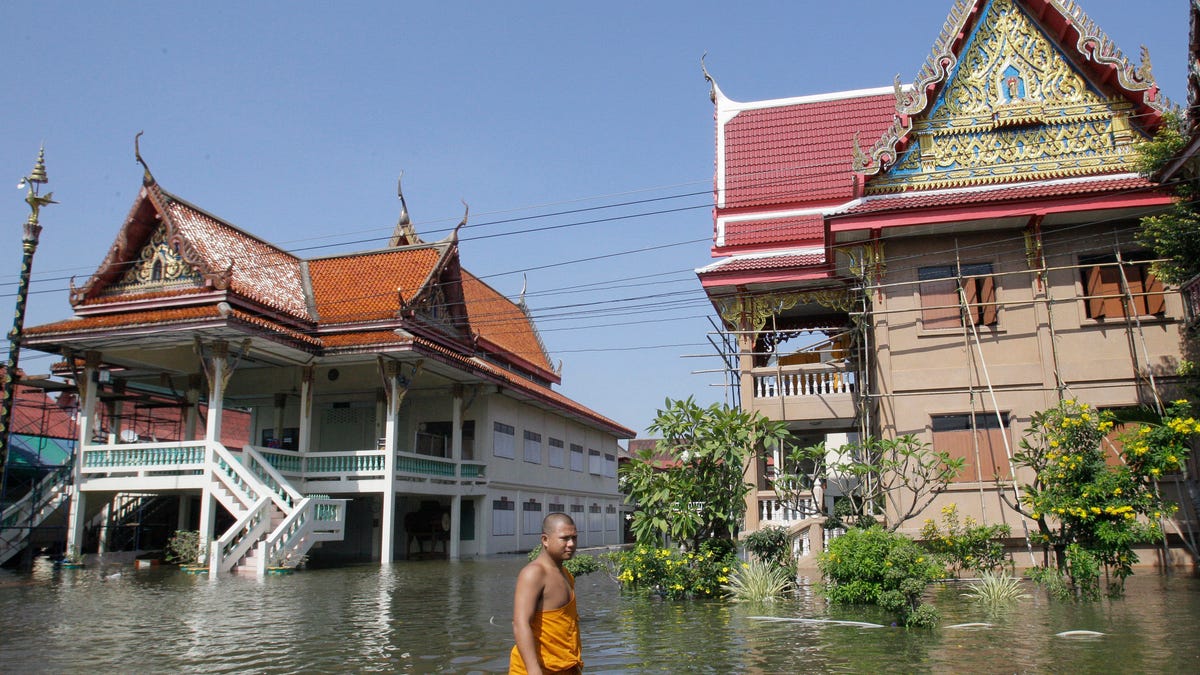
Oct. 19, 2011: Thai Buddhist monk wades through a flooded street at Ban Kadee temple in Phatum Thani province, north of Bangkok ,Thailand.
BANGKOK-- Thailand's new premier acknowledged Wednesday that the country's flood crisis has overwhelmed her government, and she pleaded for mercy from the media and solidarity from the country in battling the relentless waters.
In an emotional appearance before reporters, Prime Minister Yingluck Shinawatra said her administration is doing all it can and trying to be as clear as possible about where the flooding may strike next.
However, mixed messages from officials in recent days about whether the floodwaters will enter Bangkok have left people confused. A poll by ABAC, associated with Bangkok's Assumption College, found that 87 percent of 415 people surveyed did not trust information from the government's flood command center.
"We have been doing everything we can, but this is a big national crisis," Yingluck said. "I'm begging for mercy from the media here."
Bangkok's city government, headed by the opposition, urged residents in seven northern districts to move belongings to safe places because of likely flooding. The warning came days after some officials had indicated the worst threat had passed. Meanwhile, flooding in areas directly north of the city worsened despite frantic government efforts to stave off the water.
The death toll in nationwide flooding is 317, mostly from drowning, with nearly 9 million people affected and 27 of the country's 77 provinces still inundated. Initial estimates of the economic cost of destroyed shops, paralyzed factories and swamped farmland were $3 billion, but have since been rising.
Floodwaters in northern areas began in August and have slowly crawled south toward the Gulf of Thailand, though the government has notched up the urgency of flood-control efforts only in the past two weeks.
"The government had said over and over again they were able to handle the situation, then what happened? It got flooded from there to here," said Puntip Susuntitapong, a 61-year-old retired banker in Bangkok.
Yingluck had no previous government experience when she came into power in August as the standard-bearer for the party aligned with her brother, Thaksin Shinawatra, who is a fugitive on corruption convictions but still widely popular.
A distraught Yingluck appealed Wednesday to reporters to stop asking whether Bangkok will be inundated.
"The more you ask questions like this, the less useful it is going to be," she said, adding that her role was to coordinate, not disseminate information. She said experts were more qualified than she to give information, and that her own personal views "might lead to lack of confidence and confusion among the people."
"We are telling the truth, not concealing anything from the people," she said. "We have been doing everything we can, but this is a big national crisis. On our own, we can't get it done. We need unity from every side, and today we must set politics aside."
The administration's low point in handling the floods may have been Oct. 13 when Science Minister Plodprasop Suraswadi issued a spur-of-the-moment order on live television to immediately evacuate an area north of Bangkok. Within 20 minutes, he and his colleagues from the government's flood emergency team were back on the air to rescind the order.
"I'm confused every time I hear the warning from the government," said Somjai Dokkam, a 51-year-old female recycling worker in Bang Kradee, north of Bangkok, whose house was flooded Wednesday morning.
Adding to the discontinuity in the public message have been the discrepancies between Yingluck's government and that of Bangkok Governor Sukhumbhand Paribatra, who belongs to a rival party.
Sukhumbhand has consistently said Bangkok will likely face flooding even as Yingluck's government has expressed confidence that the city's defenses will hold up. The governor mobilized droves of citizens to build sand-bag levees Tuesday, saying flooding in many neighborhoods was otherwise imminent.
The city so far has escaped substantial flooding, thanks to dikes, underground tunnels and other defenses, though floodwaters have been seeping into some northern neighborhoods.
In Bang Kradee, 49-year-old Prasit Thamnita, a worker at Thammasat University, said the best approach was to simply rely on his own judgement.
"I've lived here my whole life, so I knew the water was definitely coming. The government doesn't know better than the locals," he said. "I only rely on myself and the local municipality for any news about the water," he said.
Elsewhere in Bang Kradee, defenders were making a last stand at an industrial park threatening to become the sixth major one in Thailand to be swamped.
Flooding of five other industrial parks north of Bangkok has idled hundreds of factories and about 200,000 workers while disrupting regional supply chains for computer hard drives and automobiles.







































